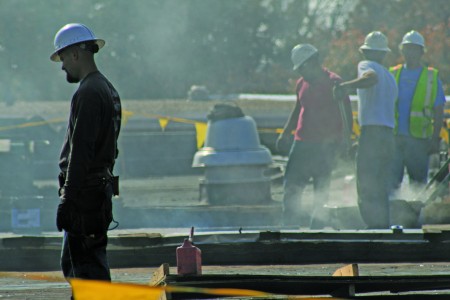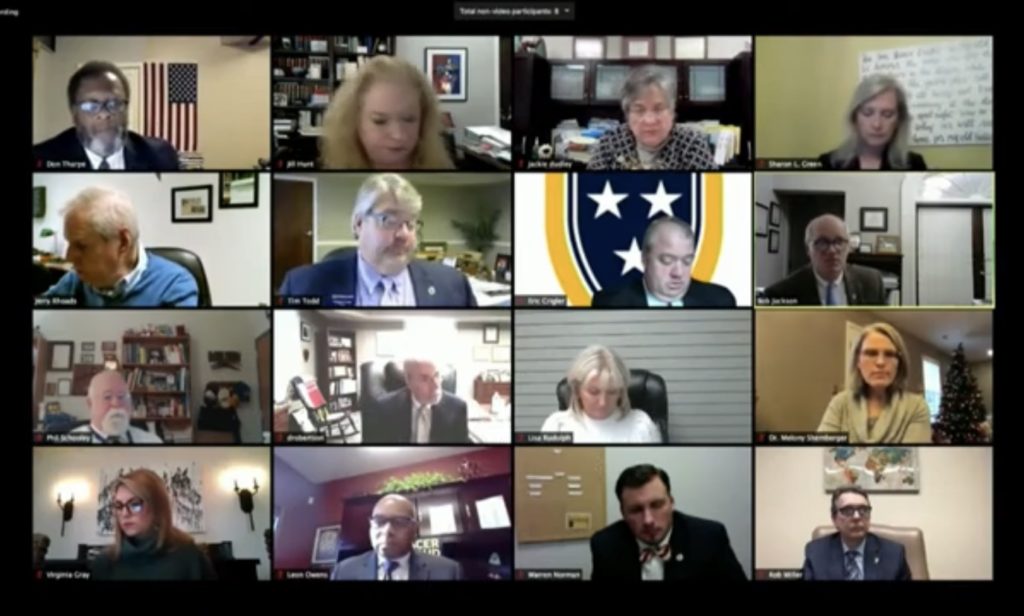
Even universities have to do a little house cleaning every now and then.
While much of the work the University tries to schedule during the less crowded and warmer summer months, some projects do come up while regular classes are in session – not unlike the maintenance roof work on Wells Hall this month.
Lined out through specific stipulations in the University 2012-13 Operating Budget, Facilities Management has a calculated budget of nearly $13 million for this year, which goes to support funding for projects such as building and equipment maintenance, building services, facility design and construction and utilities.
Of the $12.9 million for this year’s budget, Chief Facilities Officer Kim Oatman said the University spends an average $1.7 million per year on maintenance across the University.
For every project visible to the general public, such as the new basketball facility, however, there exists almost hidden cosmetic improvements to buildings like Wilson Hall and the eventual demolition of Ordway Hall, Oatman said there are even more projects organized unbeknownst to students and faculty alike.
“These maintenance tasks do often go unnoticed since they take place on top of the roofs, in mechanical rooms of buildings and even sometimes underground,” Oatman said. “However, they are essential to the operations of the University.”
While the crew at Facilities Management can handle many of the daily tasks required to maintain the general upkeep of the University, some tasks, Oatman said, are just too big for the Management staff.
One such project is the repair and re-tarring of the Wells Hall roof.
Despite the best efforts of the employees of Facilities Management, large renovations and improvements are best completed with the help of outside assistance and the budget supports these contractors.
“It is essential to keep water from infiltrating our buildings, so due to age and deterioration all of our roofs get replaced periodically,” Oatman said. “Our crews do routine maintenance such as cleaning out roof drains and making minor repairs, but due to the equipment and expertise required to re-roof a building, it is typically much more efficient to have done by external roofing contractors.”
With the job bid out on Sept. 6, Swift Roofing Inc. in Murray made the lowest bid for the Wells Roof Replacement Project, bidding the job at $153,090. The project includes removal of existing roof, new insulation, new 4-ply felt roof with asphalt coatings and all new counter flashing around the perimeters.
Oatman said the funding for roof replacement came from an internal repair account designated and planned for the purpose and was part of the operating cost fixed in the University budget. The project is expected to finish late this month.
Don Robertson, vice president of Student Affairs, said repairs conducted for the University were less about getting by and more about precedence and planning, as preventative maintenance is definitely planned each and every year through committees and consultations with University officials and in coordination with Facilities Management.
“There is a budget and a priority list of things that need to be done,” Robertson said. “(Facilities Management) has money set aside for unexpected needs. (The University) puts aside X amount of dollars for our residence halls, as well, and there is money set aside for major construction and also day-to-day operational maintenance.”
While several educational and general campus buildings fall under the care of Facilities Management, Robertson said there are some buildings under the care of Auxiliary funding, which is also an appropriation within the 2012-13 University budget but operate under their own funding on a yearly basis.
“Auxiliary buildings have to pay for themselves,” Robertson said. “There are no University dollars that go into the auxiliary buildings. Winslow, the T-Room and other facilities have to come out of the Auxiliary budget.”
With student and faculty traffic at high points during the fall and spring semesters, several projects go on hold until the summer when most of the students have gone back home and workers can move freely in the buildings.
Bonnie Higginson, vice president of Academic Affairs and whose office is in Wells Hall, said she understood while some maintenance had to occur regardless of the inconveniences and costs, all proper care and consideration is taken when deciding which projects need to come first.
“I know Facilities Management is very conscious of access issues and would not engage in a project during the academic year that would cause a major disruption,” Higginson said. “I guess I would term these minor disruptions as just minor frustrations for most of us.”
Story by Edward Marlowe, Staff writer.


































































































